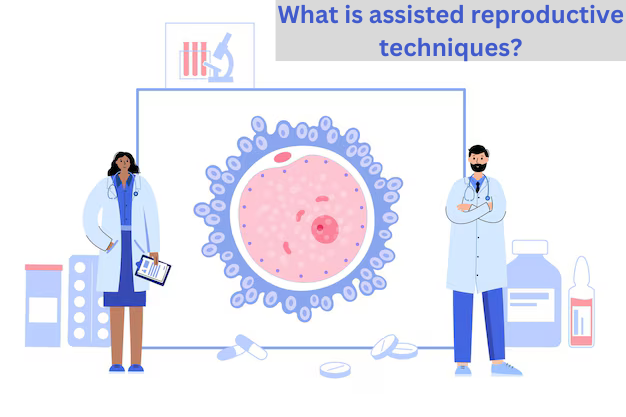What is assisted reproductive techniques?
Assisted Reproductive Techniques (ART) encompass a range of medical procedures designed to help individuals and couples struggling with infertility achieve their dream of parenthood. These techniques involve manipulating sperm and eggs in a laboratory setting to increase the chances of fertilization and successful pregnancy.
Common ART Procedures
Several ART procedures are commonly used:
In Vitro Fertilization (IVF): This is the most well-known ART technique. It involves retrieving eggs from the ovaries, fertilizing them with sperm in a laboratory dish, and then transferring the resulting embryos
Intracytoplasmic Sperm Injection (ICSI): ICSI is a specialized technique used in conjunction with IVF. It involves injecting a single sperm directly into an egg to facilitate fertilization.
Gamete Intrafallopian Transfer (GIFT): In GIFT, eggs and sperm are placed directly into the fallopian tubes, where fertilization occurs naturally.
Zygote Intrafallopian Transfer (ZIFT): Similar to GIFT, ZIFT involves fertilizing eggs and sperm in a laboratory and then transferring the resulting zygotes (fertilized eggs) into the fallopian tubes.
Who Can Benefit from ART?
ART can be a viable option for individuals and couples facing various infertility challenges, including:
Female Factor Infertility: Conditions such as blocked fallopian tubes, ovulation disorders, endometriosis, or diminished ovarian reserve.
Male Factor Infertility: Issues like low sperm count, poor sperm motility, or abnormal sperm morphology.
Unexplained Infertility: When no specific cause can be identified.
Couples with Genetic Disorders: ART can allow for preimplantation genetic testing to screen embryos for genetic abnormalities.
The ART Process
The ART process typically involves several steps:
Initial Consultation: A comprehensive evaluation, including medical history, physical examination, and diagnostic tests, is conducted to assess the couple's fertility status.
Stimulation of Ovulation: Medications are administered to stimulate the ovaries to produce multiple eggs.
Egg Retrieval: Eggs are retrieved from the ovaries using a minimally invasive procedure.
Fertilization: Eggs are fertilized with sperm in a laboratory setting, either through IVF or ICSI.
Embryo Culture: Fertilized eggs (embryos) are cultured in a laboratory for several days.
Embryo Transfer: The selected embryos are transferred into the uterus using a thin catheter.
Pregnancy Test: A pregnancy test is performed a few weeks after the embryo transfer.
Success Rates and Considerations
The success rates of ART vary depending on factors such as age, underlying infertility diagnosis, and the specific technique used. It's important to discuss the potential risks and benefits of ART with a fertility specialist.
New World Fertility Centre: Your Partner in Parenthood
New World Fertility Centre in Delhi is a state-of-the-art facility dedicated to providing comprehensive fertility care. Our experienced team of fertility specialists offers personalized treatment plans tailored to each individual's needs.
Contact Us
Assisted Reproductive Techniques offer a valuable pathway to parenthood for individuals and couples dealing with infertility. With continuous improvements in technology, ART success rates are higher than ever, giving renewed hope to those on their fertility journey.
Frequently Asked Questions (FAQ)
1. What are Assisted Reproductive Techniques (ART)?
ART refers to a range of medical procedures used to treat infertility by manipulating eggs, sperm, and embryos. This includes methods such as In Vitro Fertilization (IVF), Intracytoplasmic Sperm Injection (ICSI), and others aimed at helping individuals and couples conceive.
2. Who is a suitable candidate for ART?
ART can benefit anyone facing challenges with conception, including those with blocked fallopian tubes, ovulation disorders, low sperm count, endometriosis, or unexplained infertility. It is also an option for individuals wishing to delay pregnancy or pursue genetic testing of embryos.
3. What is the success rate of ART?
Success rates vary depending on factors such as the woman’s age, the cause of infertility, and the specific technique used. For example, IVF has a high success rate, especially with advanced options like preimplantation genetic testing. At New World Fertility Centre, we provide personalized assessments to give you a clearer picture of your chances.
4. How does In Vitro Fertilization (IVF) work?
In IVF, eggs are retrieved from the ovaries and fertilized with sperm in a laboratory. Once embryos develop, one or more are transferred into the uterus, with the goal of achieving pregnancy.
5. What is Intracytoplasmic Sperm Injection (ICSI)?
ICSI is a specialized form of IVF where a single sperm is directly injected into an egg to facilitate fertilization. It is often used in cases of male infertility with low sperm count or motility.

 Aug-01-2025
Aug-01-2025